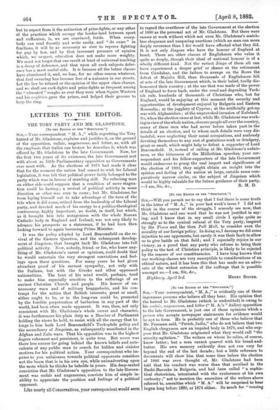LETTERS TO THE EDITOR.
THE TORY PARTY AND MR. GLADSTONE. [To THE EDITOR OF THE "SPECTATOR."]
SIR,—Your correspondent "M. A.," while regretting the Tory hatred of Mr. Gladstone, explains and justifies it, on the ground of the opposition, unfair, ungenerous, and bitter, as, with all the emphasis that italics can bestow he describes it, which was offered by Mr. Gladstone to the late Government. Now, for the first two years of its existence, the late Government met with about as little Parliamentary opposition as Governments ever meet with. As the elections of 1874 had made it clear that for the moment the nation had ceased to wish for Liberal legislation, it was felt that political power fairly belonged to the party which was in favour of standing still. No reflecting man on either side could suppose that a condition of mere stagna- tion could be lasting ; a revival of political activity in some direction or other was sure to come ; but Mr. Gladstone, far from laying himself out to take advantage of the turn of the tide when it did come, retired from the leadership of the Liberal party, and devoted much of his energy to a politico-theological controversy, highly important, no doubt, in itself, but which, as it brought him into antagonism with the whole Roman Catholic body in England and Ireland, was not very likely to advance his prospects as a statesman, if he had been then looking forward to again becoming Prime Minister.
It was the policy adopted by Lord Beaconsfield on the re- vival of the Eastern Question, and the subsequent develop- ment of Jingoism, that brought back Mr. Gladstone into full political activity. Now, nobody, friend or foe, who knew any- thing of Mr. Gladstone's career or opinions, could doubt that he would entertain the very strongest convictions and feel- ings upon these questions. For many years he had given abundant proof of his earnest sympathy, not only with the Italians, but with the Greeks and other oppressed nationalities. The bent of his mind would, perhaps, tend to make him especially sensitive to the sufferings of an ancient Christian Church and people. His horror of un- necessary wars and of military braggadocio, and his con- tempt for the notion that British interests, great or small, either ought to be, or in the long-run could be, promoted by the forcible perpetuation of barbarism in any part of the world, had been often made apparent. It was, then, not only consistent with Mr. Gladstone's whole career and character, it was furthermore his plain duty as a Member of Parliament holding the views he held, to resist with all the energy that be- longs to him both Lord Beaconsfield's Turkophile policy and the ascendancy of Jingoism, as subsequently manifested in the Afghan and Zulu wars. That his opposition was in the highest degree vehement and persistent, is quite true. But never was there less excuse for going behind the known beliefs and ante- cedents of any public man to search for hidden and sinister motives for his political action. Your correspondent who im- putes to you unfairness towards political opponents considers not the beam that is in his own eye, while animadverting upon the mote which he thinks he beholds in yours. His deep-seated conviction that Mr. Gladstone's opposition to the late Govern- ment was unfair and ungenerous, convicts him of simple in- ability to appreciate the position and feelings of a political opponent.
Like nearly all Conservatives, your correspondent would seem to regard the overthrow of the late Government at the election of 1880 as the personal act of Mr. Gladstone. But there were causes at work without which not even Mr. Gladstone's match- less eloquence and unsparing exertions (which no man can more deeply reverence than I do) would have effected what they did. It is not only Jingoes who have the honour of England at heart. There are other classes of Englishmen who value it quite as deeply, though their ideal of national honour is of a wholly different kind. Not the veriest Jingo of them all can have experienced a deeper grief or shame at the retirement from Candahar, and the failure to avenge on the Boers the defeat of Majuba Hill, than thousands of Englishmen felt at acts of the late Government which, in their belief, foully dis- honoured their country ; at the use that was made of the power of England to force back, under the cruel and degrading Turk- ish rule, hundreds of thousands of Christians who, but for England, would be enjoying at this moment the security and opportunities of development enjoyed by Bulgaria and Eastern Ron melia ; at the jugglery of Cyprus ; at the artificially got-up war with Afghanistan ; at the unprovoked invasion of Zululand. So, when the election came at last, while Mr. Gladstone was work- ing in view of the whole nation, obscure people all over the country, many of them men who had never before taken part in the details of an election, and to whom such details were very dis- tasteful, were neglecting their usual occupations, and zealously devoting themselves to any sort of gratuitous work or drudgery, great or small, which might help to defeat a supporter of Lord Beaconsfield. If, instead of railing at Mr. Gladstone's unfair- ness, or the bitterness of the Midlothian speeches, your cor- respondent and his fellow-supporters of the late Government would endeavour to grasp the real import and significance .of the election of 1880, they might obtain an insight into the opinion and feeling of the nation at large, outside some com- paratively narrow circles, on the subject of Jingoism which would be highly valuable for the future guidance of their party.


































 Previous page
Previous page